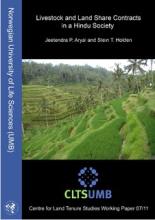/ library resources
Showing items 1 through 9 of 56.An exclusive focus on external forces risks the production of an overgeneralized account of a ubiquitous neoliberalism, which insufficiently accounts for the profusion of local variations that currently comprise the neoliberal project as a series of articulations with existing political economic
Economic and legal reforms have triggered waves of conflict over property rights and access to urban land in Vietnam. In this article I develop four epistemic case studies to explore the main precepts and practices that courts must negotiate to extend their authority over land disputes.
Studies of land property rights usually focus on tenure security and transfer rights. Rights to determine how to use the land are regularly ignored. However, user rights are often limited.
Land reform, land politics and resettlement in Laos have changed people’s land access and livelihoods. But these reforms have also transformed political subjectivity and landed property into matters for government to a degree hitherto unknown in Laos.
In the early 1990s, the Lao government launched a nationwide Land Use Planning and Land Allocation programme in a bid to foster socio-economic development while protecting the environment. However, the programme has long been perceived as having negative impacts on rural livelihoods.
ABSTRACTED FROM INTRODUCTION: Women’s access to and control over land can potentially lead to gender equality alongside addressing material deprivation. Land is not just a productive asset and a source of material wealth, but equally a source of security, status and recognition.
This paper examines factors related to the existence of a livestock rental market in western Nepal and assesses whether this is associated with caste differentiation and land rental market participation.
The caste system is an intricate part of the institutional structure as well as class formation, political instability and conflicts in Nepal. The most severely discriminated group in the caste system is the Dalits, the so-called “untouchables”.
This study assesses the determinants of forest land allocation to households in the forest tenure reforms in China in the period 1980-2005 using data from three provinces in Southern China; Fujian, Jiang Xi and Yunnan.
Pagination
Land Library Search
Through our robust search engine, you can search for any item of the over 73,000 highly curated resources in the Land Library.
If you would like to find an overview of what is possible, feel free to peruse the Search Guide.




